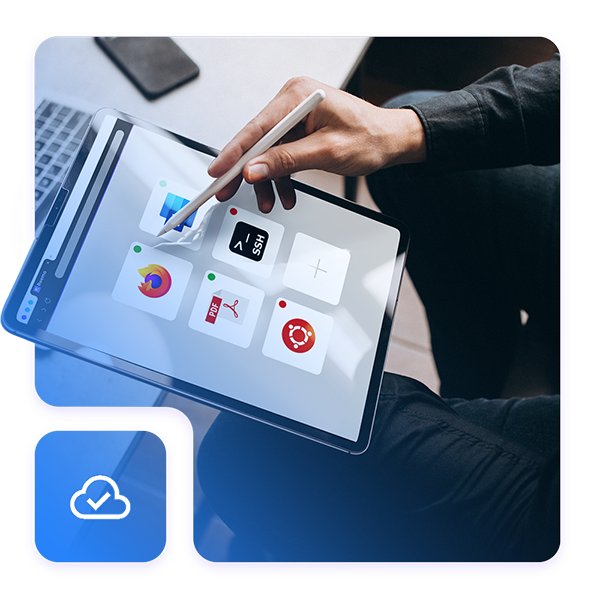In today’s increasingly flexible work environment, being able to securely access remote systems...
Remote access for work computer from home : 5 secure tips
Remote work is here to stay, but with great flexibility comes great responsibility—especially when it comes to protecting your data. These five security rules will help keep you and your company safe, no matter where you set up your office for the day.

- Prioritize Secure Remote Access
When you’re working from home, or anywhere outside the office, you need to make sure your connection is secure. Don’t just assume your internet is safe; take steps to protect it.
- Use a trusted, secure connection: Avoid open or unverified Wi-Fi, especially in public places. Choose remote access solutions that ensure your data is encrypted.
- Choose solutions designed for remote work: Basic VPNs can leave you vulnerable. Opt for remote access tools that give you both performance and security.
- Monitor access and permissions: Only grant systems access to people who need it for their job. Minimizing permissions reduces the risk of breaches. You can also only have access to specifics softwares and apps thanks to containers.
- Log out or disconnect: Always log out or disconnect from your work systems when you’re done to avoid leaving them open to attack.
- Reemo’s Secure Remote Desktop: Our solution provides high-performance, secure access to your workstation, perfect for heavy applications and remote teams.
- Leverage Remote Browser Isolation
If you want to surf the internet without compromising security, consider using Remote Browser Isolation. This method allows you to access web resources securely without needing to go through a desktop.
- Secure surfing: You can browse the internet securely without the need for a VPN, which means your personal browsing doesn’t affect your security once you return to the office.
- Containerization: By using Reemo’s containers, you benefit from a protocol-break between users and accessed resources, enhancing security by isolating web activity.
- Use Strong, Unique Passwords (and Enable Multi-Factor Authentication)
We get it: remembering passwords is a pain. But strong, unique passwords are essential to keeping your accounts safe, and it’s easier than you think.
- Create complex passwords: Use a mix of letters, numbers, and symbols to make it harder for hackers to guess.
- Unique passwords for different accounts: Don’t use the same password for everything—if one gets hacked, the others stay safe.
- Password managers: Use tools like LastPass or 1Password to store your complex passwords securely and automatically.
- Multi-Factor Authentication (MFA): Enable MFA whenever possible for an added layer of protection. It makes sure even if your password is compromised, hackers can’t get in.
- Change passwords regularly: Rotate your passwords every few months to stay ahead of potential threats.
- Avoid Public Wi-Fi
It’s tempting to work from a café or airport lounge, but public Wi-Fi can be a hacker’s paradise. If you need to work remotely in a public space, do it wisely.
- Avoid public Wi-Fi when possible: Public networks are often unsecure and can expose your sensitive data to cybercriminals.
- Use a personal hotspot instead: When working remotely, a personal mobile hotspot offers a more secure alternative to public Wi-Fi.
- Leverage secure remote access: If you must connect through public Wi-Fi, use a solution like Reemo Remote Desktop, which ensures secure, encrypted access to your workstation and company network without the vulnerabilities of a VPN.
- Avoid handling sensitive information in public: Even with secure access, it’s wise to avoid working on highly confidential data in public places where prying eyes may be nearby.
- Turn off automatic Wi-Fi connections: Prevent your devices from automatically connecting to untrusted networks to minimize risks.
- Keep Your Devices and Software Up to Date
Nobody likes being interrupted by software updates, but keeping your devices up to date is one of the easiest ways to stay secure.
- Update all devices: Make sure your work devices are running the latest operating system and app versions.
- Install patches immediately: Don’t ignore software patches—they often fix security vulnerabilities that could be exploited.
- Use antivirus software: Keep your antivirus programs up to date and run regular scans to catch threats early.
- Enable automatic updates: Set your devices to install updates automatically, so you don’t forget.
- Backup your data regularly: Make sure you’re backing up important files in case of a breach or system failure.
- Stay Alert to Phishing and Cyber Threats
You’re not paranoid if you’re cautious about phishing. Cybercriminals are getting smarter, and it’s crucial to stay on your toes to avoid their traps.
- Examine email addresses carefully: Phishing emails often look like they’re from someone you know—double-check the sender before responding.
- Be cautious with links: Don’t click on any links that seem suspicious. Hover over them to see the real URL before you decide.
- Report suspicious activity: If something doesn’t seem right, don’t hesitate—report it to your IT or security team immediately.
- Be skeptical of urgent requests: Scammers often try to rush you into making mistakes. Take a moment to verify any requests for sensitive information.
- Educate yourself and your team: Keep up with the latest phishing techniques through regular training and updates from your company.
By following these six security rules, remote workers can keep their data, and their company’s data, safe, no matter where they’re working from. Reemo’s secure remote access solution offers an easy and effective way to stay connected to workstations without sacrificing security or performance. Furthermore, Reemo's Remote Browser Isolation uses a protocol-break to reduce the risk of intrusion using container technology, making it less vulnerable than traditional VPNs for connecting to full work resources. More than that, the containers technology can help you to only access specific software and apps. VPNs can act as tunnels from home, which can have their own security issues, but with Reemo, you get a more secure and efficient solution.

.png?width=50&name=Design%20sans%20titre%20(1).png)


